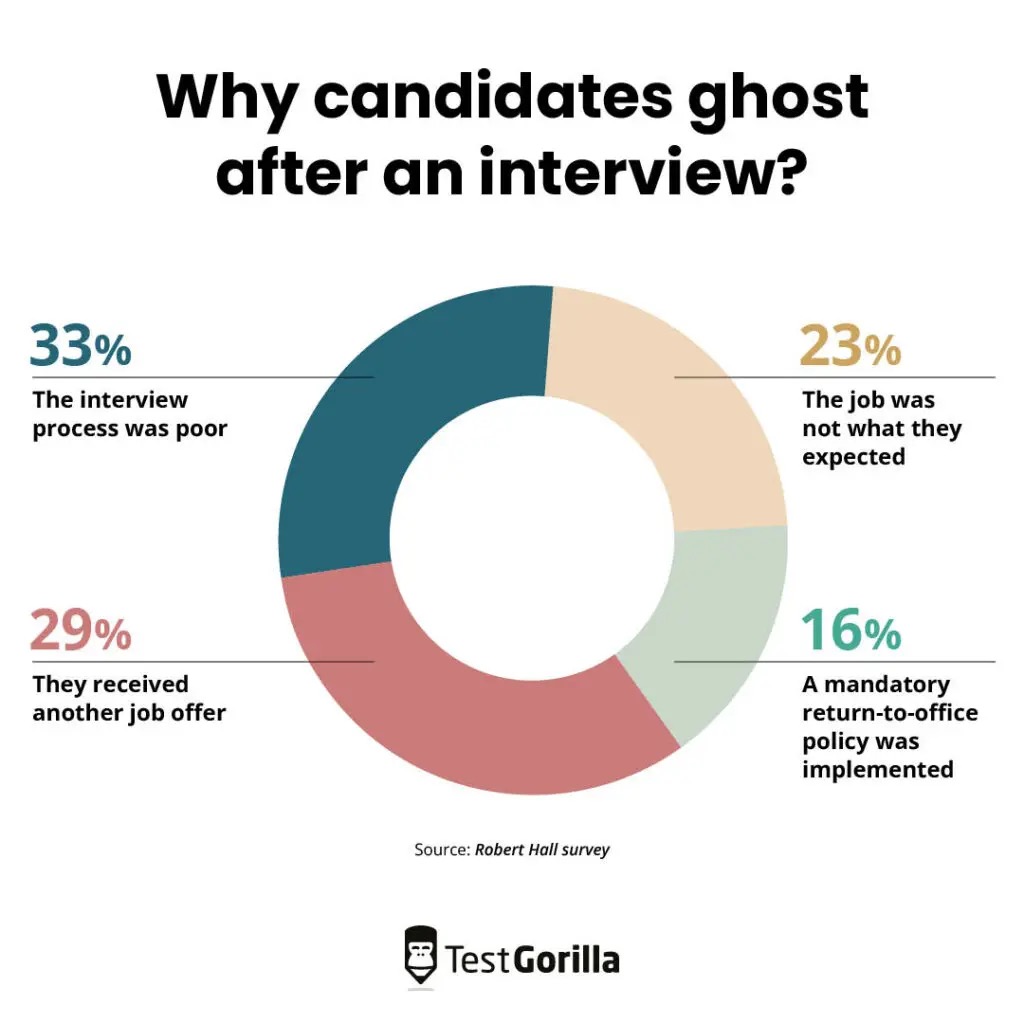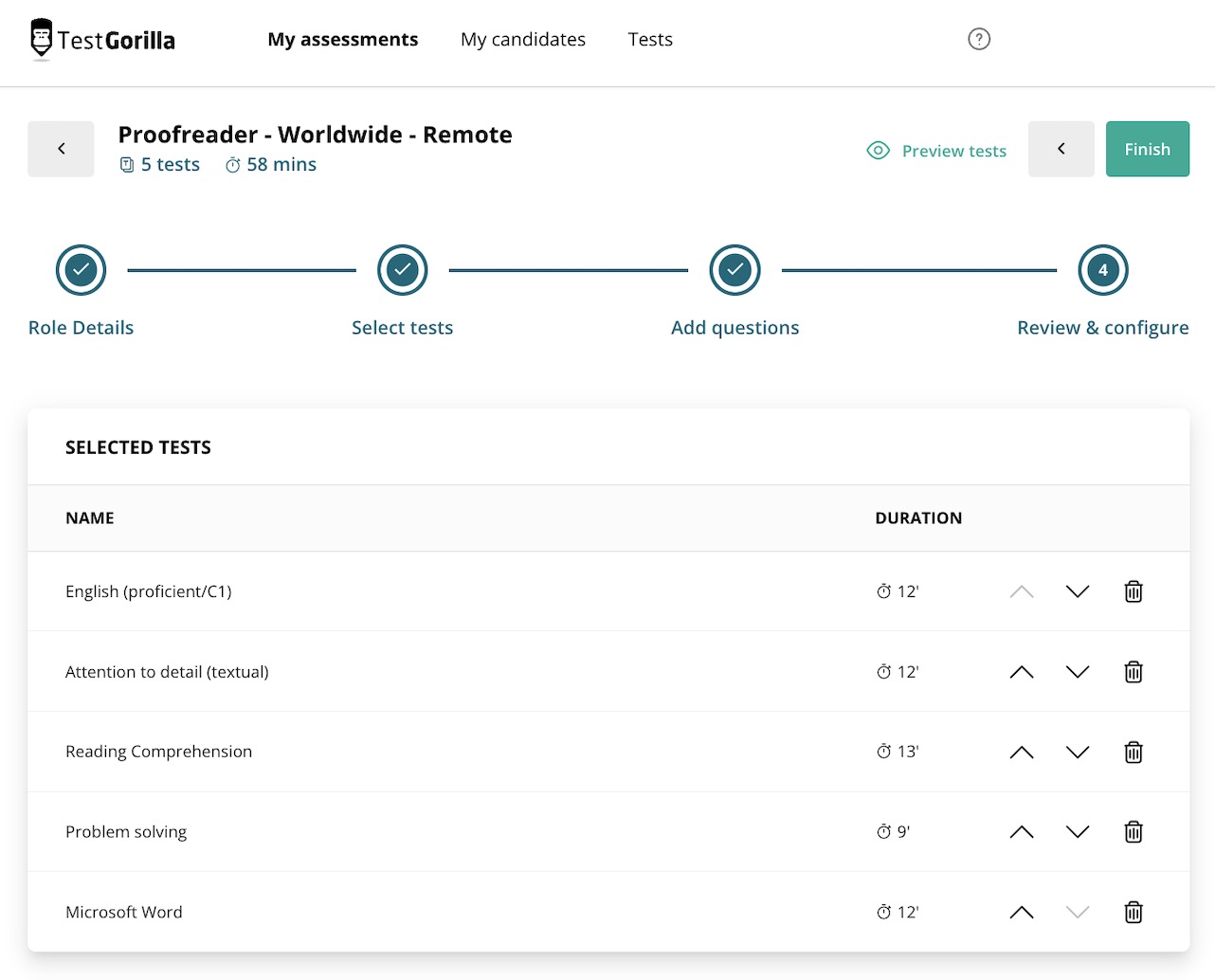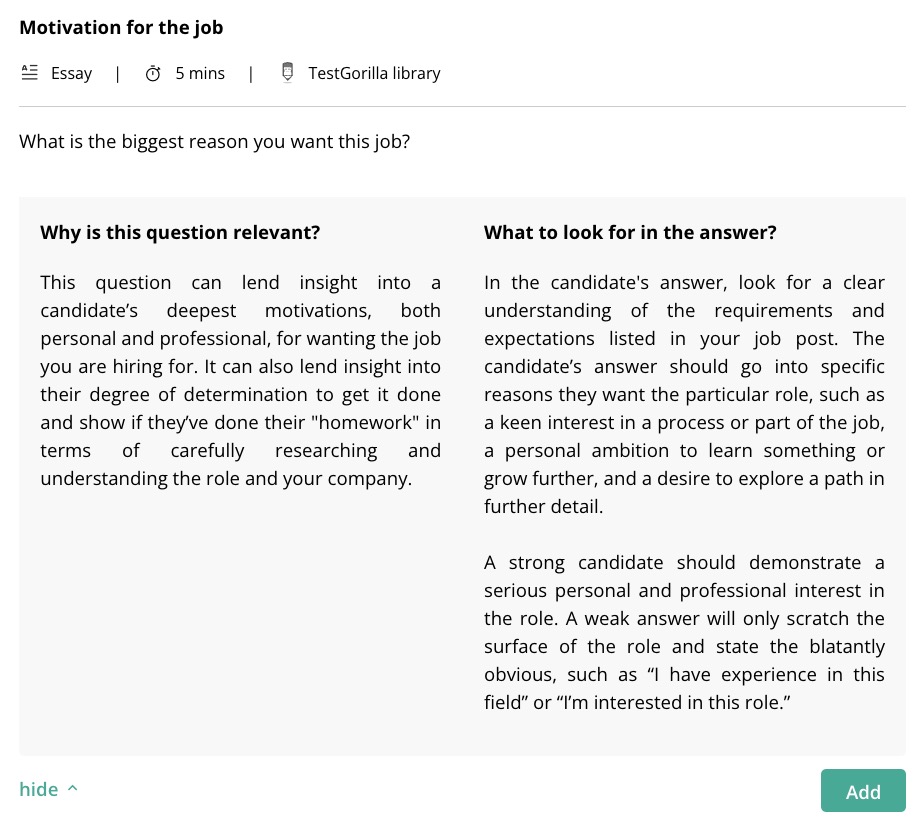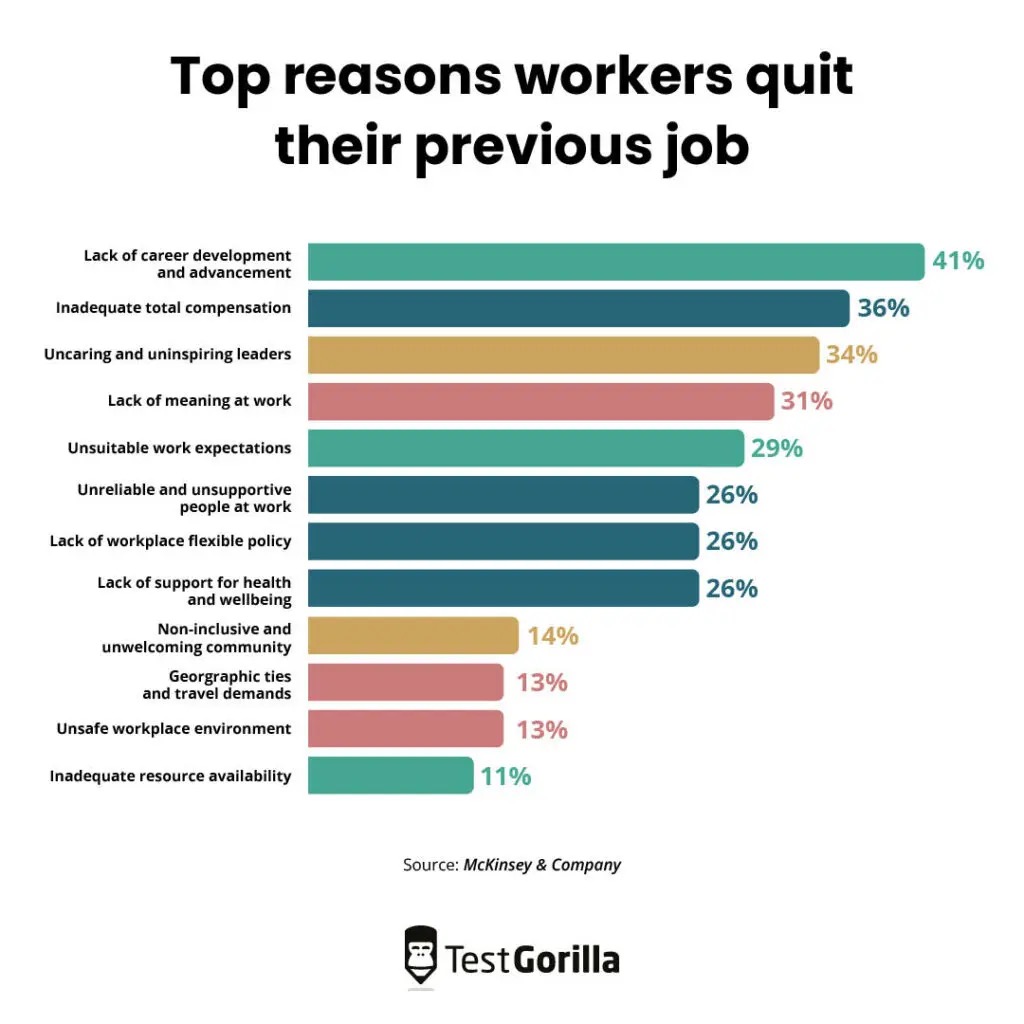Being ghosted after interviewing feels terrible, whether you’re a candidate or an employer.
However, it’s depressingly common. An Indeed survey claims employers saw a 77% increase in job ghosting between 2022 and 2023. On the flip side, Greenhouse reports that 75% of candidates have experienced recruiter ghosting at least once.
Ghosting after an interview is a symptom of a broken hiring process. It drives up recruitment costs, tarnishes company reputations, and leaves applicants feeling unworthy and frustrated.
So why do companies ghost you after interviews, and what causes applicants to do the same?
Below, we explore why ghosting is so common on both sides, how applicants can bounce back, and how employers can prevent no-shows – for example, through skills-based recruiting.
Table of contents
What is recruiter ghosting?
Recruiter ghosting is when a hiring company abruptly stops communicating with job candidates. They don't call, text, or respond to emails.
The more concerning issue is, why do employers ghost after interviews?
Candidates experience ghosting by recruiters when they:
Stop receiving updates on the application process
Receive no responses to emails or texts
Have no indication they've been rejected
Companies ghosting job applicants frustrate people who put genuine time and effort into preparing for interviews.
What is candidate ghosting?
Like recruiter ghosting, hiring managers might hear nothing back from applicants – a phenomenon known as candidate ghosting. This is more common earlier in the hiring process, but it can also happen later, after one or more rounds of interviews, and even after an offer has been accepted. Ghosting after the final interview might suggest an applicant has found a better opportunity elsewhere.
Telltale signs of a candidate ghosting jobs and interviews include:
Rejecting proposed dates for job interviews without offering alternatives
Long delays before responses
Missed deadlines
No more questions or a lack of interest in further interviews
Zero response to messages
Why are people ghosted after job interviews?
On both sides, receiving little to no contact during the hiring process can seem rude, abrupt, and even concerning.
However, there are several reasons why recruits and recruiters ghost after interviews.
Why do employers ghost after interview?
Glassdoor research suggests that mentions of ghosting after interviews have tripled since before the pandemic, with jobseekers who apply through recruiters at the most risk of being ghosted. The lack of response is typically for one of three reasons:
They’ve hired someone else
Something’s changed, but they can’t tell you
They forgot to reach out
Here’s what that all means.
1. They’ve hired someone else
Getting an offer accepted by a great candidate can be a cause for recruiters to celebrate, particularly when hiring for a challenging role. However, that means other candidates can get left behind. This scenario could also happen if there’s miscommunication between HR and any recruiters they partner with.
2. Something’s changed, but they can’t tell you
Another common reason companies ghost applicants is that something has changed that they are not at liberty to discuss. This might be the announcement of a period of restructuring, a hiring freeze, or perhaps a perfect internal candidate has thrown their hat into the ring.
3. They forget to reach out
The last reason why recruiters ghost may be simple human error. HR teams might forget to follow up with a candidate if:
They’re hiring for several roles at once
Their hiring team is short-staffed
The recruiter responsible for the role goes away on vacation
The point of contact for that candidate leaves the organization
In rare cases, some recruiters might not know how to reject a candidate. Regardless, when employers ghost candidates, it leaves a sour taste in applicants’ mouths.
Why are candidates ghosting employers?
Every candidate is different, and their reasons for ghosting employers vary widely. However, most instances of candidate ghosting happen because:
The hiring process is too long
They’ve realized they’re not a good fit
They’ve taken another job
Let’s dive deeper.
1. The hiring process is too long
According to Greenhouse, more than 70% of job seekers said they would not complete a job application if it takes more than 15 minutes.
This applies to response time, too. Research from Robert Half reveals that 62% of professionals claim to lose interest in a job if they don’t get a response within 10 business days, and this figure jumps to 77% after three weeks.
2. They’ve realized they’re not a good fit
Candidates may also resort to ghosting if the interview process makes them realize they’re not a good match for a company. Further studies from Robert Half found that a third of candidates ghosted after an interview because the interview process was poor, while 23% said the job was not what they expected.
3. They’ve taken another job
Many people stop responding when they receive another job offer, which accounts for 29% of ghosting cases. Candidates are likely looking for multiple new job opportunities at once. They’re likely to snatch up a quality position as soon as possible in their job hunt.
The best insights on HR and recruitment, delivered to your inbox.
Biweekly updates. No spam. Unsubscribe any time.
How to handle ghosting by recruiters
Being ghosted after final interviews can still happen even if you follow all the best practices.
So, candidates must be ready to deal with ghosting by recruiters smoothly and efficiently.
Here are our top tips for staying in touch with your recruiter if you're ghosted after a job interview.
Follow up gently
Follow up once or twice on an unanswered email to give recruiters the benefit of the doubt and a chance to get back to you. Life gets in the way.
If a hiring manager is embarrassed about ghosting your original message, a small, non-judgmental prompt could help remedy the situation. For instance, you could say, "I wanted to thank you for giving me the opportunity to interview. Please let me know if you need anything further from me that might support my application."
Explain that you understand
Give recruiters an “out” in your follow-up messages. Let them know that if they’ve found another candidate or things have changed behind the scenes, you understand and would be open to any feedback they have.
This sort of thank-you note makes you look fair-minded, and if you’re willing to interview for them again, it might work in your favor in their talent pool. You don't truly know who else is in your recruiter's network.
Try contacting another member of the team
If you're mainly in contact with one recruiter or manager, try contacting a colleague if their email is available or through LinkedIn if you have connections. Even if you do this to get feedback, you show that you care about what the company thinks of you, and it's good to get closure.
“Break up” on good terms
If you’re still waiting for a response, send the company a polite “breakup” communication. If you still haven’t heard from them after some gentle nudging, wish them the best in their talent hunt.
It’s crucial for you to end on a positive note in the event that you decide to apply with the same company again in the future.
Move on quickly
Don't let ghosting by recruiters affect your job search. Plenty of other opportunities exist, so don't take it personally. Above all, learn from the experience. What could you do differently next time around?
Why recruiters ghosting candidates is bad for business
Employers ghosting applicants and applicants ghosting employers are two sides of the same coin. The former creates a bad candidate experience; the latter is a reaction to it.
Routinely creating a bad candidate experience can be catastrophic for an employer brand. Those who have a particularly bad experience might even take to social media to share it.
A positive candidate experience, on the other hand, can set firms apart from the competition since nearly 60% of job seekers have suffered a poor candidate experience in the past.
Ghosting ultimately burns the bridge with talent who may have otherwise been a great fit for future positions in the company – even a simple thank you email can go a long way in today’s job market.
7 tips and best practices to reduce interview ghosting in your organization
Clearly, ghosting is rife in recruiting, and ghosting after final interview can be especially harmful to an organization’s branding.
If you're a recruiter who's concerned about getting ghosted after the final interview and wants to tighten up the hiring process, use the following tips to reduce no-shows.
7 tips to reduce job ghosting for recruiters: A summary
Tips to reduce ghosting after interview | Example action |
Write better job descriptions | Deconstruct existing roles based on the skills required to depict what you’re looking for more accurately |
Set a time frame for recruitment and be transparent about it | Include a concrete timeline for recruitment in the job ad |
Use skills-based hiring to streamline screening and interview the right people | Use “culture add” and motivation tests to make sure applicants are aligned with your values |
Establish clear communication guidelines for recruiters | Provide recruiters with templates for handling rejections |
Offer legitimate flexible working policies | Be honest about your flexible working policies – don’t exaggerate |
Spend time showing off your company culture | Use employee testimonials to show you’re an organization that cares about your employees |
Review your compensation and benefits packages | Explore other incentives you could offer |
1. Write better job descriptions
According to Jobtrain, almost 80% of candidates wouldn’t apply for a job if it didn’t specify a salary. Therefore, quality job descriptions should at least include a salary range, along with other key information about the role.
The best job descriptions are clear and precise about the skills required.
Imagine how a candidate for a programmer role might feel if you claim you need Python coding skills, but then expect them to be proficient in JavaScript in your phone interview. The fact you didn’t mention this in your job description is a big red flag to frustrated applicants who, understandably, ghost you after the first interview.
Take a skills-based hiring approach and ensure that your job descriptions align with the actual skills needed for the role to prevent this kind of scenario.
The benefits go even further, too, as TestGorilla research shows that 56% of employees prefer skills-based hiring to resume and experience checks.
Prevent ghosting with TestGorilla
Switch to a hiring process candidates prefer and prevent ghosting with TestGorilla. Sign up today for free!
Start by “deconstructing” the role you’re hiring for. What are some of the core skills needed for the job?
Consider hard skills and soft or “power” skills. For a proofreader, say, you'd look for hard skills such as literacy and software expertise alongside soft skills like critical thinking and time management. Then, build talent assessments based on these skills and offer them at the first selection round.
For example, here’s a five-test assessment for a proofreader you could build through TestGorilla:
Of course, your testing and hiring needs may vary. That's why we suggest you reach out for a free TestGorilla demo and see how our software works.
2. Set a time frame for recruitment, and be transparent about it
Once you create your job ad, include a clear timeline for recruitment that covers:
When shortlisted applicants hear about interviews
The time range in which each stage of interviews takes place
When candidates hear back from the final decision-makers
When the successful applicant starts employment
Keeping applicants informed about their candidacy provides a positive experience, even to those who aren’t shortlisted, as they’ll know they haven’t been successful without you reaching out.
You should then reconfirm this timeline throughout the hiring process, always signing off with a note about when people should next hear from you. If something interferes with this timeline, be sure to send out notifications as soon as possible.
3. Use skills-based hiring to streamline screening and interview the right candidates
Once you use an accurate ad to attract people from the job market and set their expectations, the next step is to ensure you only invite the best candidates to interview. The best way to do this is with pre-employment skills testing.
Let’s say you approach an accountant for their exceptional numeracy skills and industry knowledge. On paper, they’re a great candidate.
However, after learning more about your company, ethos, and what the job actually entails at the interview, they ghost you, no longer interested.
Using personality, culture add, and motivation tests helps you find the perfect match for your company culture and values and weeds out unsuitable candidates early in the hiring process.
Here’s an example of the types of questions asked in TestGorilla’s Motivation test:
We’ve seen firsthand how it improves the candidate experience. Check out our case studies and learn how some companies switched to TestGorilla to extend their positive experience from recruitment events into the assessment process.
In addition, more than 80% of Fortune 500 companies already use psychometric tests for hiring, and 81% say it produces better hires.
See how skills testing works
To see how skills testing works up close and prevent ghosting after final interviews in your process, you can always register for a Free Forever account with TestGorilla.
4. Establish clear communication guidelines for recruiters
Many applicants who’ve ghosted after final interviews have done so because of poor communication.
Recruiters should keep candidates updated about their progress early and often, from their first application right up to onboarding successful applicants. This creates a better experience and establishes a bond between the candidate and the recruiter. This bond makes it less likely that an applicant disappears without a trace.
You don’t even have to do it all manually. You can use automatic follow-up emails to keep people in the loop and invite them to contact you for more information.
Make sure your communication guidelines include templates for handling internal changes that might disrupt hiring, like a hiring freeze, and when rejecting candidates for a job.
Nobody wants to be ghosted after an interview, especially when unsuccessful. But thankfully, strong candidate communication can soften the blow.
5. Offer legitimate flexible working policies
One of the big mistakes organizations make that causes candidates to ghost them is that they exaggerate the extent of their flexible working policy.
Some companies tell candidates that they offer fully remote working, and then, at the last moment, they reveal that this is only after employees have worked for one year in the office. Alternatively, they might need to be back at the corporate headquarters once a month.
But in a climate where, according to Slack, 72% of all knowledge workers prefer hybrid working, this simply isn’t good enough.
Play to this majority with a flexible working policy that appeals to working parents, mature students, and remote employees. Follow through on your promises by referring to flexible working during recruitment, and be open to questions about the policy.
Even better, share evidence of your flexibility with case studies and testimonials from flexible workers who enjoy being part of your team.
6. Spend time showing off your company culture
It’s worth remembering that the hiring process isn’t just about the candidate selling you on their skills; it’s about you selling them on your workplace culture.
Jobseekers rank company culture highly when deciding to take a role, with 86% of people taking Jobvite’s Job Seeker Nation Report saying it is somewhat or very important.
If you pride yourself on having a cohesive culture, this is an opportunity to set yourself apart from the competition. The first step is not just to describe your company culture but to show it to your applicants. For example, you could use employee testimonials to demonstrate that your organization cares about its employees and their wellbeing.
7. Review your compensation and benefits packages
If you’re following all of the best practices above and still not seeing a dent in the number of people who ghost after interviews, it’s time to consider whether your compensation and benefits packages just aren’t cutting it.
Are you asking for too much and offering too little?
Analyze the roles that have prompted the most candidate ghosting and compare the salary with industry benchmarks.
Explore additional incentives you could offer employees, or even consider providing candidates with incentives while they’re still in the hiring process. For instance, you could give candidates access to learning materials during hiring to help them develop skills, with the promise that there’s more to come once hired.
Business leaders highly recommend this tactic to add value to the recruitment process and reduce attrition.
In fact, McKinsey & Company found that one of the biggest factors driving attrition was a lack of career advancement and development. As such, showing a commitment to this during hiring can help you stand out as a potential employer.
Don’t get ghosted after interviews again
Why do recruiters ghost? It’s usually a case of mixed messages and human error. Candidates ghost recruiters, too – often because they’re unimpressed with the hiring process.
Whether you’re ghosted by a recruiter after an interview or are left waiting around for a promising candidate, you now know how to handle this frustrating phenomenon.
Being ghosted after an interview is frustrating for everyone involved. However, by acting professionally and showing the other party you understand their needs, it's easy to cut down job ghosting before it worsens.
As a recruiter, the next step is to apply the strategies above – and, if you haven’t already done so, embrace skills-based hiring to reduce people ghosting interviews.
To get started with skills-based methods in your next round of hiring and ensure you invite only the best to interview, take a free product tour, and let us show you what TestGorilla can do.
Alternatively, if you’d like to discuss your specific needs with our team, reach out for a free 30-minute demo.
Then, if you're ready to get started but aren't necessarily ready to commit, try our talent assessments out with our Free Forever Plan.
Ghosting jobs FAQs
Why do employers ghost after interviews? Let’s close this guide with some frequently asked questions about ghosting interviews and what causes it.
Why do companies ghost you after an interview?
Professional ghosting occurs to job applicants when recruiters are overwhelmed with recruitment demand, when other applicants blindside them, and even when they simply forget to follow up. Recruiters, however, experience ghosting from prospects who feel hiring processes drag on too long, that they’re not right for a role, or who find other more suitable jobs elsewhere.
Is it normal to get ghosted after interviews?
Unfortunately, it is common to get ghosted after job interviews, with at least 75% of job applicants claiming they’ve been ghosted by a recruiter after an interview. However, it’s common for recruiters to face ghosting, too, with applicant no-shows increasing by around 77% year on year. As for why recruiters ghost, it’s often down to poor communication.
Why are so many people ghosting after the final interview?
Recruiters and applicants often ghost interviews because of better opportunities, admin demand elsewhere, or simply because they forget to follow up at the end of the day. In many cases, people are ghosting jobs because the other party hasn’t lived up to expectations, but they don’t address this openly – and instead, skip out of the process.
How do you respond to being ghosted after a final interview?
Try not to take ghosting after job interviews personally
Try and make contact with the candidate or recruiter once or twice
Assure the other party you understand and make your final position clear
Gently “break up” and move on to other opportunities
Don’t get hung up on “why do companies ghost you after interview” if it happens a few times – it’s not you, it’s them
If you’ve been ghosted by a recruiter after interviews and still feel frustrated, read our guide above for more tips on how to move forward.
You've scrolled this far
Why not try TestGorilla for free, and see what happens when you put skills first.




















